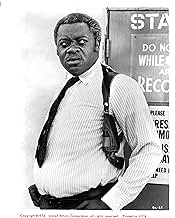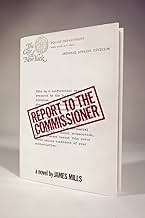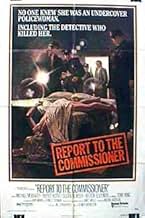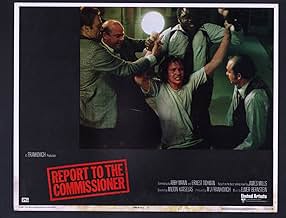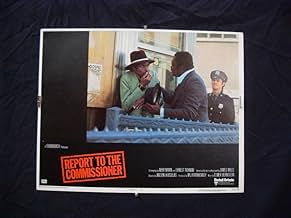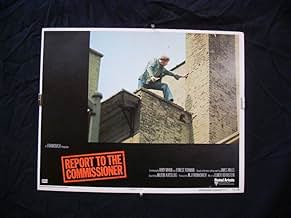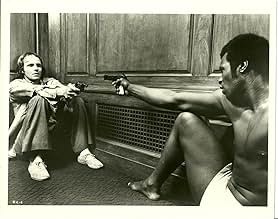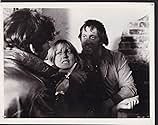IMDb RATING
6.7/10
1.4K
YOUR RATING
Politics skew the probe of a rookie detective's accidental shooting of an undercover policewoman.Politics skew the probe of a rookie detective's accidental shooting of an undercover policewoman.Politics skew the probe of a rookie detective's accidental shooting of an undercover policewoman.
- Director
- Writers
- Stars
- Awards
- 2 nominations total
Bob Balaban
- Joey Egan
- (as Robert Balaban)
Bebe Drake
- Dorothy
- (as Bebe Drake Hooks)
- Director
- Writers
- All cast & crew
- Production, box office & more at IMDbPro
6.71.4K
1
2
3
4
5
6
7
8
9
10
Featured reviews
Cops don't even like each other
A not too likable, idealistic young detective is given an assignment which was unnecessary and therefore led to a tragedy and a shakeup in the police hierarchy. The detective, who was totally useless as a policeman, got all wrapped up emotionally with his assignment and acted completely irrationally when confronted with a dangerous situation. I liked the way the film jumped back and forth in time and depicted life in the department and in the inner city realistically. I didn't care for the way a pad happened to be placed conveniently on the rooftop so the jumpers would have a soft landing. Good drama well worth watching.
A true story........
I was one of the many bystanders who witnessed part of the major scene which took place on location in front of and inside Sak's 5th Avenue in Manhattan, a lunch hour that turned into two. I believe it was based on a true event and is documented in the NYPD files.As for the movie it was one of the best and well acted movies of the seventies in my opinion. I have been trying to get a copy of it for years.The movies involves a screw-up that leaves a female undercover cop dead because the brass feel asleep and later looked for and found a scapegoat, sound familiar? As I mentioned the acting was great, all of the cast acted as if they been NY City cops at some point in their lives.
10jdamico5
Report to the Commissioner
I just got back from a film club screening of Report to the Commissioner, followed by a Q & A with Jonathan Demme...I loved it!
I thought that Michael Moriarity's performance was amazing; he was able to capture the ambivalence of wanting to do "the right thing", according to his value system, and carrying out the legacy that his father had wanted for his older brother, who'd been killed in Vietnam.
His internal torture was brilliantly played in the elevator scene, in which he was wordless, but communicated his conflict and terror chillingly nonetheless.
The most touching scene for me was when he was giving his statement to the police officials. When he was questioned about his "subversive" college activities he poignantly stated that he had protested the (Vietnam) war. It was resonant for me, having been one of those protesters, and relevant to these times--- our war in Iraq, and the current political environment which implies that anyone protesting it is "un-American".
Looking at the demographics on this site in terms of voting on this film, I find it very interesting that my age cohort gave this film the highest ratings. Perhaps it's because we lived through times that make this film cinema verite'. I'd love to hear other's opinions on this interesting phenomenon.
I thought that Michael Moriarity's performance was amazing; he was able to capture the ambivalence of wanting to do "the right thing", according to his value system, and carrying out the legacy that his father had wanted for his older brother, who'd been killed in Vietnam.
His internal torture was brilliantly played in the elevator scene, in which he was wordless, but communicated his conflict and terror chillingly nonetheless.
The most touching scene for me was when he was giving his statement to the police officials. When he was questioned about his "subversive" college activities he poignantly stated that he had protested the (Vietnam) war. It was resonant for me, having been one of those protesters, and relevant to these times--- our war in Iraq, and the current political environment which implies that anyone protesting it is "un-American".
Looking at the demographics on this site in terms of voting on this film, I find it very interesting that my age cohort gave this film the highest ratings. Perhaps it's because we lived through times that make this film cinema verite'. I'd love to hear other's opinions on this interesting phenomenon.
Classic Seventies
Okay, so there aren't enough reviews praising this? So, I will write one. It is not so much that this film is underrated, it deserves the place it has, in the unvarnished uniqueness of post French Connection New York films greenlit because Connection won best picture. This picture is interesting because in the middle of all the crime stuff, it's center is really a chewy for relationships (the kind that guys write after watching 'The Dirty Dozen' or 'Serpico' 20 times), and it is that dark center of distrust with it's dangerous home truths that provides the engine of drama.
Ever feel like that's all life is -- police stories? This one will fuel you're suspicions, if you allow yourself to go along with it (which is hard to do), but that's what New York dark cinema is supposed to do.
But see it to celebrate Susan Blakely, with 'Rich Man Poor Man' as the second part of the double bill. She has her place as a TV queen but before that she also did some very nice work large screen and showed real promise with this pic. The wardrobe, the Tidyman script, the Tosi cinematography in New York, and with the tortured performance of Moriarty there you have it. It is not a satisfying film, that is why the reactions, but it isn't supposed to be. "Report to the Commissioner" happens every day here, ask James Mills who wrote it, he has since discovered it happens all over the world.
Watch 'The Way We Were' after to see Blakely just coming on the scene, if this one is too dark for you, or, 'Who'll Stop the Rain' to see Moriarty.
Ever feel like that's all life is -- police stories? This one will fuel you're suspicions, if you allow yourself to go along with it (which is hard to do), but that's what New York dark cinema is supposed to do.
But see it to celebrate Susan Blakely, with 'Rich Man Poor Man' as the second part of the double bill. She has her place as a TV queen but before that she also did some very nice work large screen and showed real promise with this pic. The wardrobe, the Tidyman script, the Tosi cinematography in New York, and with the tortured performance of Moriarty there you have it. It is not a satisfying film, that is why the reactions, but it isn't supposed to be. "Report to the Commissioner" happens every day here, ask James Mills who wrote it, he has since discovered it happens all over the world.
Watch 'The Way We Were' after to see Blakely just coming on the scene, if this one is too dark for you, or, 'Who'll Stop the Rain' to see Moriarty.
Know The Players
Report to the Commissioner is a film about a misfit detective who does not heed the warning of his senior partner and gets himself into one beautiful jackpot as Andy Sipowicz would put it. It's an underrated classic film from the seventies with an interesting cast and a lot of good performances.
Abby Mann wrote the original screenplay of Report to the Commissioner and Mann who is famous for writing Judgement at Nuremberg also is the creator of that classic police series Kojak from the seventies. The film does have a Kojak feel to it. Shooting the thing entirely on location in New York really helps with the believability of the plot.
Michael Moriarty plays a young and very naive detective assigned to what looks to be the Midtown North Precinct in Manhattan. He comes from a police family and he's assigned to partner with Yaphett Kotto who worked with Moriarty's father.
At the same time Susan Blakely is a young, fresh faced, but most experienced detective whose all American good looks fool a lot of perpetrators. She decides to get close to a big time drug dealer played by Tony King to get the goods on him.
To make her cover as a runaway sound feasible, higher up captain Hector Elizondo has Moriarty make some routine inquiries looking for Blakely under her street name of Chicklet. The only problem is that Moriarty takes the assignment way too seriously, earnestly trying to win respect among his peers. It results in tragedy all around.
The cast is really finely tuned in this film. Especially Elizondo who will chill you with his attitude. He turns in a fine performance as a bureaucratic cop real good at department politics, but a real snake as a human being.
In one of his earliest roles is William Devane who has only one scene in the film questioning Moriarty about what's happened. Devane's a hotshot Assistant District Attorney who's practically salivating over a homicide conviction, another scalp for his lodgepole so to speak. You will remember him.
Report to the Commissioner is a nice look at the Seventies in New York and a great police drama. You will agree that Yaphett Kotto gave Moriarty the best advice about knowing the players in a given situation.
Abby Mann wrote the original screenplay of Report to the Commissioner and Mann who is famous for writing Judgement at Nuremberg also is the creator of that classic police series Kojak from the seventies. The film does have a Kojak feel to it. Shooting the thing entirely on location in New York really helps with the believability of the plot.
Michael Moriarty plays a young and very naive detective assigned to what looks to be the Midtown North Precinct in Manhattan. He comes from a police family and he's assigned to partner with Yaphett Kotto who worked with Moriarty's father.
At the same time Susan Blakely is a young, fresh faced, but most experienced detective whose all American good looks fool a lot of perpetrators. She decides to get close to a big time drug dealer played by Tony King to get the goods on him.
To make her cover as a runaway sound feasible, higher up captain Hector Elizondo has Moriarty make some routine inquiries looking for Blakely under her street name of Chicklet. The only problem is that Moriarty takes the assignment way too seriously, earnestly trying to win respect among his peers. It results in tragedy all around.
The cast is really finely tuned in this film. Especially Elizondo who will chill you with his attitude. He turns in a fine performance as a bureaucratic cop real good at department politics, but a real snake as a human being.
In one of his earliest roles is William Devane who has only one scene in the film questioning Moriarty about what's happened. Devane's a hotshot Assistant District Attorney who's practically salivating over a homicide conviction, another scalp for his lodgepole so to speak. You will remember him.
Report to the Commissioner is a nice look at the Seventies in New York and a great police drama. You will agree that Yaphett Kotto gave Moriarty the best advice about knowing the players in a given situation.
Did you know
- TriviaFirst film of Richard Gere.
- GoofsWhen Michael Moriarty is chasing Tony King through the street, at first King is barefoot, but at certain instances, you can tell he has on shoes, then later in the chase scene, he is barefoot again.
- Quotes
Richard 'Crunch' Blackstone: [laughing] It happened. They sent us a hippy.
- SoundtracksLoving You Gets Better With Time
Written by Vernon Burch, Spencer Proffer, Jeffrey Marmelzat
Performed by Vernon Burch
Greatest Character Actors of All Time
Greatest Character Actors of All Time
The talented actors totally transform for their roles. How many do you recognize?
- How long is Report to the Commissioner?Powered by Alexa
Details
- Release date
- Country of origin
- Language
- Also known as
- Investigación peligrosa
- Filming locations
- 625 8th Avenue, Manhattan, New York City, New York, USA(Crunch smacks around a pimp with the Port Authority Bus Terminal in the background)
- Production company
- See more company credits at IMDbPro
Contribute to this page
Suggest an edit or add missing content


